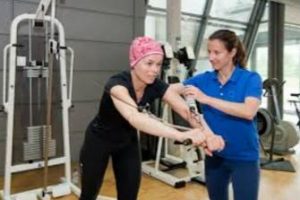Cancer Patients May Not Get The Rehab They Need: A Missed Opportunity To Consider
This blog post first appeared at: Curious Dr. George
 Rehabilitation medicine is one of the best-kept secrets in healthcare. Although the specialty is as old as America’s Civil War, few people are familiar with its history and purpose. Born out of compassion for wounded soldiers in desperate need of societal re-entry and meaningful employment, “physical reconstruction” programs were developed to provide everything from adaptive equipment to family training, labor alternatives and psychological support for veterans.
Rehabilitation medicine is one of the best-kept secrets in healthcare. Although the specialty is as old as America’s Civil War, few people are familiar with its history and purpose. Born out of compassion for wounded soldiers in desperate need of societal re-entry and meaningful employment, “physical reconstruction” programs were developed to provide everything from adaptive equipment to family training, labor alternatives and psychological support for veterans.
Physical medicine and rehabilitation (PM&R) then expanded to meet the needs of those injured in World Wars I & II, followed closely by children disabled by the polio epidemic. In time, people recognized that a broad swath of diseases and traumatic injuries required focused medical and physical therapy to achieve optimal long term function. Today, cancer patients frequently benefit from comprehensive rehabilitation as they recover from the effects of chemo (neuropathy, weakness, and cognitive impairments), radiation (scarring and range of motion limitations), surgery (flaps, plastics procedures, tumor resection, amputations), and brain injuries (edema, debulking, gamma knife and neurosurgery).
Rehabilitation is a phase of recovery occurring after any major life-changing medical or surgical event. Our bodies are designed to regenerate and repair, though optimizing this process takes skilled guidance. PM&R physicians (also known as physiatrists) are trained to use physical modalities (stretching, strengthening, heat, cold, etc.) to mechanically enhance healing. They prescribe medications to manage pain, spasticity, nerve injury, and cognitive impairments, while also leveraging the power of physical therapy to increase cardiopulmonary fitness, muscle strength and flexibility. PM&R physicians are also experts in neurologic injury, and can adapt exercises to coax spinal cord, brain and peripheral nerve injuries to construct new pathways for movement and repair.
Inpatient rehab’s prime directive is to get patients back home. To succeed at home, patients need to be able to function as independently as possible, using trained assistants for managing the activities that cannot be performed without help. Admission to a rehab hospital or unit offers the patient home practice opportunities – with simulated challenges that can include everything from terrain parks, test kitchens, medication management trials, driving simulators, balance tests, electric wheelchairs and even exoskeletons that allow paralyzed patients to walk again. It is like a robotic Disney World, with endless aquatic and equipment possibilities for restoring movement and independence.
When I discuss admission to inpatient rehab with my cancer patients, I ask them about their goals, motivation, and energy levels. Timing of rehab is important, because it must dovetail with treatment, so that the physical exertion strengthens, not saps, the patient. Often times when a person is newly diagnosed with cancer, they want “everything done” – intensive chemo/radiation/surgery as well as rehab/exercise. But staggering these interventions can be more effective.
In other cases when care is palliative, learning new skills and being fitted with battery or electric-powered equipment can mean the difference between living at home or in an assisted environment. Some successful cancer patients come to inpatient rehab to practice managing their activities of daily living with varied amounts of assistance, preparing for increased needs as time goes on so they can enjoy being at home for as long as possible.
For the physiatrist, cancer is a cause of impairments that can be overcome with creativity and practice, no matter the long-term prognosis. Adaptive equipment, physical exercise, and cognitive retraining may be applied intensively (3 hours a day in the inpatient setting), or at a slower outpatient pace, depending on individual need. Rehab physicians desire to support and sustain patient function at the highest level, and “add life to years.” As such, rehabilitation should be considered an integral part of successful cancer care and management.


 Hope is a tricky thing. On the one hand, false hope can lead patients to opt for painful, futile treatments at the end of life. On the other, unnecessarily bleak outlooks can lead to depression and inaction. When health is at stake, presenting information with the right amount of hope can guide patients away from both suffering needlessly and/or succumbing to treatable disease.
Hope is a tricky thing. On the one hand, false hope can lead patients to opt for painful, futile treatments at the end of life. On the other, unnecessarily bleak outlooks can lead to depression and inaction. When health is at stake, presenting information with the right amount of hope can guide patients away from both suffering needlessly and/or succumbing to treatable disease.







